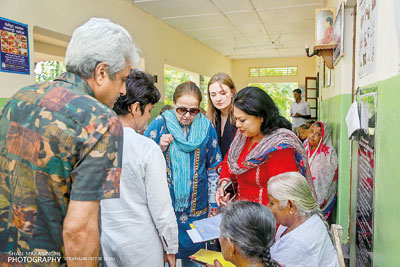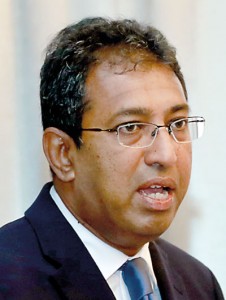News
A closer look at COBRA
Two high-level and equally important events took place recently – one in a Colombo hotel and the other in rural and impoverished Pallama in Puttalam.

A visit to Pallama – The COBRA-BPS study’s Steering Committee sees implementation at the grassroots level
Both were linked to the spectre of high blood pressure which is holding people in its vice-like grip, causing premature deaths not only in Sri Lanka but across the world, having a disastrous impact on South Asia.
The Colombo meeting on October 1 took an in-depth look at a groundbreaking study — using grassroots level health workers to take the message about the gravity of hypertension if not controlled – and how to move forward.
On Tuesday, it was to Pallama that they journeyed to see firsthand how Public Health Midwives (PHMs) on their motorcycles armed with checklists were in action in the field.
The Colombo meeting was no mere talk shop – for hypertension (high blood pressure) is expected to affect more than 1.5 billion people across the world, in just seven years, by 2025.
The impact on South Asia is immense and in Sri Lanka the prevalence of hypertension is estimated to be 25% — 1 in every 4 adults. Hypertension is the leading cause of cardiovascular and kidney diseases.
This is why the ongoing multi-country ‘Control of Blood Pressure and Risk Attenuation – Bangladesh, Pakistan, Sri Lanka’ (COBRA-BPS) study in rural communities in these countries is timely.
The future lies in scaling up the study to include co-morbidities including diabetes, it is learnt, while not diluting the other very successful programmes such as mother and child health at the grassroots. The study comes in the backdrop of the Sri Lankan government’s policy to revamp primary healthcare services with a special focus on non-communicable disease (NCD) control.
“Our project (COBRA-BPS) has shown excellent integration of hypertension management strategies in the public sector in Sri Lanka. We received positive feedback from patients, nurses, PHMs, physicians and district managers,” pointed out the study’s Principal Investigator in Sri Lanka, Prof. Asita de Silva from the Faculty of Medicine, University of Kelaniya.
There is now greater awareness about high blood pressure and the need for continuous treatment among patients in the study cohort, which is very encouraging. We need to build on these efforts and plan a national scale-up now, he reiterated at the half-day Policy Forum on Hypertension and Cardio-Metabolic Diseases – Impact on Health Systems in Sri Lanka, Bangladesh, Pakistan and Regional Countries.

Dr. Harsha de Silva

Prof. Asita de Silva
The forum was co-organized by the Faculty of Medicine, University of Kelaniya and Duke-NUS Medical School, Singapore, while the COBRA-BPS research project is being funded by the United Kingdom’s Medical Research Council (MRC), the Wellcome Trust, the Department for International Development (DFID), the National Institute for Health Research (NIHR) and the UK Government’s Global Challenges Research Fund (GCRF).
The forum saw the participation of key government, donor, research and global health stakeholders, with robust discussions to identify efforts across South Asian countries to prevent, pre-empt, treat and manage and reduce the prevalence and risk of hypertension and NCDs including related co-morbidities such as diabetes and cardiovascular and kidney disease in South Asia.
The long-term goals of the study in Puttalam, meanwhile, are to gauge whether these low-cost interventions by health workers are scalable and sustainable. Then these interventions can be implemented not only throughout Sri Lanka but also in South Asia to prevent people from going to an early grave due to hypertension.
The State Minister of National Policies and Economic Affairs, Dr. Harsha de Silva who was the chief guest at the forum said that the government has understood the rising burden of NCDs.
“We are actively channelling resources to deal with this challenge. With over US$ 1 billion budgeted for healthcare next year, we are committed to improving the general health of our population,” he said, pointing out that Sri Lanka’s excellent indices are due to a highly organized and well-executed primary healthcare system.
Investments by successive governments have been the reason for achieving a high level of human development, significantly higher than the countries in our income cohort.
Detailing the steps taken by this government, the State Minister said they include increasing the priority given to NCDs in the health budget, making essential medicines more affordable and provision of a pre-hospital care ambulance service.
“When making essential medicine more affordable, we must have a balance so that these medicines continue to be available. Whilst people appreciate tremendously the reduction in the prices of medicine, we also hear complaints of regularly purchased medicines not being available in pharmacies,” Dr. de Silva added.
The Lead Investigator of the COBRA-BPS study, Prof. Tazeen Jafar from Duke-NUS Health Services & Systems Research said that “up to 3 out of 4 adults with hypertension in South Asia have poorly controlled blood pressure and one-third have co-existing diabetes”.
It was a major concern as complications including heart attack, stroke and kidney disease, tend to manifest 5-7 years earlier in South Asians than in Caucasian European populations, she pointed out.
Linking up with the forum participants through a live video broadcast, the Co-chair of the World Health Organization’s Independent Commission on the UN High-Level Meeting on Prevention and Control of NCDs, Dr. Sania Nishtar underscored the need for Universal Health Coverage (UHC) to include hypertension and diabetes care for all segments of the population.
“Countries are crying out desperately for help. This is evidenced by data from the WHO’s Country Cooperation Strategies in more than 150 countries. We could end up undermining the economic viability of UHC if plans fail to address the world’s leading killer,” she said.
While explaining that there is a need to push a few hot buttons to reduce premature mortality, Dr. Nishtar stressed that tackling hypertension should be a No. 1 priority and the COBRA-BPS study has brought about key evidence.
She created the image of two women awaiting treatment at a clinic – one is living with HIV (Human Immunodeficiency Virus) and the other is a diabetic.
With much funding for HIV, the first woman will walk into a room with all the sophisticated equipment, while the second will have only antiquated equipment in the treatment and management of this NCD, she lamented.
The former WHO Senior Advisor on NCDs, Prof. Shanthi Mendis reiterated that hypertension should not be considered in isolation, instead all NCDs should be considered as a whole.
She said that vertical hypertension and diabetes programmes cannot address these diseases in a sustainable and equitable manner and are not suitable for resource constrained settings. Instead, in the context of UHC a public health strategy/approach is needed. To implement such a strategy, national targets need to be set for reducing behavioural risk factors which impact on health outcomes (tobacco, alcohol and physical inactivity) and best-buy interventions implemented to attain them.
As such a national target should be set and attained to reduce the population’s salt intake to reduce the incidence of hypertension. Managing hypertension and diabetes through a total risk approach in primary care (best buy) should be an integral component of the minimum services package of UHC initiatives.
The 2030 Sustainable Development Agenda provides a unifying platform and new opportunities to address hypertension, diabetes and NCDs in the context of UHC.
During the panel discussion on ‘Lessons learnt’ through the COBRA-BPS study, Dr. Anuradhani Kasturiratne said that it has created a miniature model on how to get about tackling hypertension, which would be useful when scaling up the programme.
The Sri Lanka team which is part of the three-year COBRA-BPS trial launched in 2016 supported by the Health Ministry includes Prof. Channa Ranasinha, Dr. Nathasha Luke, Dr. Kasturiratne, Dr. Manuja Perera and Dr. Dileepa Ediriweera of the Kelaniya University’s Faculty of Medicine.
“We all know that if we have hypertension, if we are careful about our diet, engage in exercise and take our medication, we’ll be okay. Even though there were many systemic challenges, the COBRA-BPS study has shown that we can do it and do it at a low cost,” said Dr. Kasturiratne.
It was Chandradasa from the fishing village of Mahawewa in Puttalam, a participant in the COBRA-BPS study who showed the reality at ground-level among impoverished rural folk and revealed the benefits of the study.
Having been diagnosed with hypertension about five years ago, he says that earlier “indala hitala beheth gaththa” (he took his medication only on and off) as he did not know the gravity of it and the need to control high blood pressure.
He described how the PHM visited him and advised him on the seriousness of hypertension and also how it could impact on his family if he did not look after himself. He had been told of the need for compliance in taking his medicines, while the whole family had been advised on the usage not only of salt but also oil and sugar.
The COBRA-BPS study enrolled 2,500 people in 30 rural communities in the three countries. In Sri Lanka, PHMs after extensive training, armed with tools to check blood pressure, fanned out on motorcycles to 10 remote Grama Niladhari areas in the Puttalam district. They visited 100 homes each, checking the blood pressure of every adult while spreading the message on hypertension, how changes in food habits and lifestyle including exercise could make a major difference. They also stressed on compliance to drug therapy, if these adults were already hypertensive.
The PHMs refer patients with high blood pressure to the closest hospital, manned by doctors who have undergone training on the simple first-line and second-line of therapy as per national and international guidelines on controlling hypertension. Thereafter, the PHMs keep a tab on the patients to ensure that they take their medication and go for check-ups regularly.
| 65% had uncontrolled/poorly-controlled high blood pressure – COBRA study | |
| Here are the highlights of the baseline information of the study population in Puttalam published in the American Journal of Hypertension recently:
|

